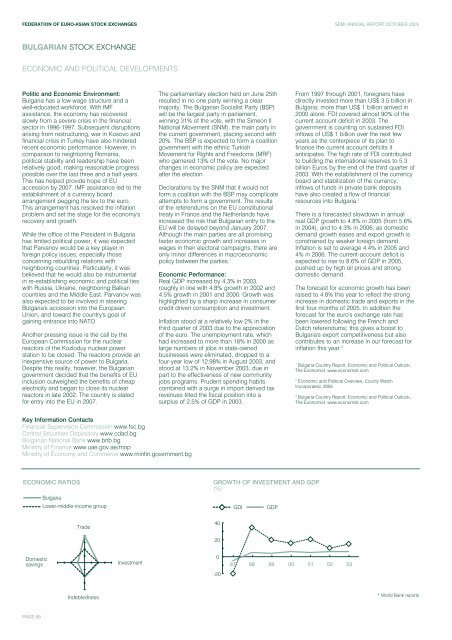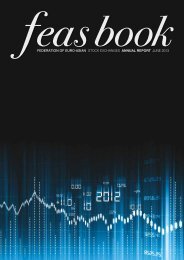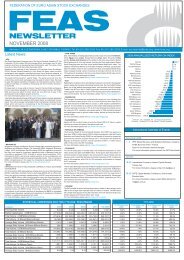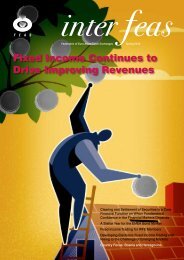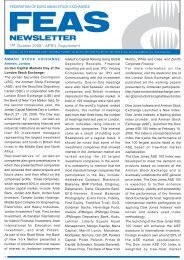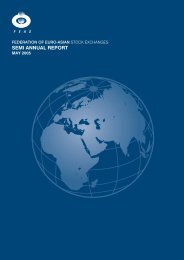Download - FEAS
Download - FEAS
Download - FEAS
Create successful ePaper yourself
Turn your PDF publications into a flip-book with our unique Google optimized e-Paper software.
FEDERATION OF EURO-ASIAN STOCK EXCHANGES SEMI ANNUAL REPORT OCTOBER 2005<br />
BULGARIAN STOCK EXCHANGE<br />
ECONOMIC AND POLITICAL DEVELOPMENTS<br />
Politic and Economic Environment:<br />
Bulgaria has a low wage structure and a<br />
well-educated workforce. With IMF<br />
assistance, the economy has recovered<br />
slowly from a severe crisis in the financial<br />
sector in 1996-1997. Subsequent disruptions<br />
arising from restructuring, war in Kosovo and<br />
financial crisis in Turkey have also hindered<br />
recent economic performance. However, in<br />
comparison to neighboring Romania,<br />
political stability and leadership have been<br />
relatively good, making reasonable progress<br />
possible over the last three and a half years.<br />
This has helped provide hope of EU<br />
accession by 2007. IMF assistance led to the<br />
establishment of a currency board<br />
arrangement pegging the lev to the euro.<br />
This arrangement has resolved the inflation<br />
problem and set the stage for the economy's<br />
recovery and growth.<br />
While the office of the President in Bulgaria<br />
has limited political power, it was expected<br />
that Parvanov would be a key player in<br />
foreign policy issues, especially those<br />
concerning rebuilding relations with<br />
neighboring countries. Particularly, it was<br />
believed that he would also be instrumental<br />
in re-establishing economic and political ties<br />
with Russia, Ukraine, neighboring Balkan<br />
countries and the Middle East. Parvanov was<br />
also expected to be involved in steering<br />
Bulgaria's accession into the European<br />
Union, and toward the country's goal of<br />
gaining entrance into NATO<br />
Another pressing issue is the call by the<br />
European Commission for the nuclear<br />
reactors of the Kozloduy nuclear power<br />
station to be closed. The reactors provide an<br />
inexpensive source of power to Bulgaria.<br />
Despite this reality, however, the Bulgarian<br />
government decided that the benefits of EU<br />
inclusion outweighed the benefits of cheap<br />
electricity and began to close its nuclear<br />
reactors in late 2002. The country is slated<br />
for entry into the EU in 2007.<br />
Key Information Contacts<br />
Financial Supervision Commission www.fsc.bg<br />
Central Securities Depository www.cdad.bg<br />
Bulgarian National Bank www.bnb.bg<br />
Ministry of Finance www.uae.gov.ae/mop<br />
Ministry of Economy and Commerce www.minfin.government.bg<br />
ECONOMIC RATIOS<br />
Domestic<br />
savings<br />
PAGE 68<br />
Bulgaria<br />
Lower-middle-income group<br />
Trade<br />
Indebtedness<br />
Investment<br />
The parliamentary election held on June 25th<br />
resulted in no one party winning a clear<br />
majority. The Bulgarian Socialist Party (BSP)<br />
will be the largest party in parliament,<br />
winning 31% of the vote, with the Simeon II<br />
National Movement (SNM), the main party in<br />
the current government, placing second with<br />
20%. The BSP is expected to form a coalition<br />
government with the ethnic Turkish<br />
Movement for Rights and Freedoms (MRF)<br />
who garnered 13% of the vote. No major<br />
changes in economic policy are expected<br />
after the election.<br />
Declarations by the SNM that it would not<br />
form a coalition with the BSP may complicate<br />
attempts to form a government. The results<br />
of the referendums on the EU constitutional<br />
treaty in France and the Netherlands have<br />
increased the risk that Bulgarian entry to the<br />
EU will be delayed beyond January 2007.<br />
Although the main parties are all promising<br />
faster economic growth and increases in<br />
wages in their electoral campaigns, there are<br />
only minor differences in macroeconomic<br />
policy between the parties. 1<br />
Economic Performance:<br />
Real GDP increased by 4.3% in 2003,<br />
roughly in line with 4.8% growth in 2002 and<br />
4.5% growth in 2001 and 2000. Growth was<br />
highlighted by a sharp increase in consumer<br />
credit driven consumption and investment.<br />
Inflation stood at a relatively low 2% in the<br />
third quarter of 2003 due to the appreciation<br />
of the euro. The unemployment rate, which<br />
had increased to more than 18% in 2000 as<br />
large numbers of jobs in state-owned<br />
businesses were eliminated, dropped to a<br />
four-year low of 12.98% in August 2003, and<br />
stood at 13.2% in November 2003, due in<br />
part to the effectiveness of new community<br />
jobs programs. Prudent spending habits<br />
combined with a surge in import derived tax<br />
revenues tilted the fiscal position into a<br />
surplus of 2.5% of GDP in 2003.<br />
GROWTH OF INVESTMENT AND GDP<br />
(%)<br />
40<br />
20<br />
0<br />
-20<br />
97<br />
GDI GDP<br />
From 1997 through 2001, foreigners have<br />
directly invested more than US$ 3.5 billion in<br />
Bulgaria; more than US$ 1 billion arrived in<br />
2000 alone. FDI covered almost 90% of the<br />
current account deficit in 2003. The<br />
government is counting on sustained FDI<br />
inflows of US$ 1 billion over the next few<br />
years as the centerpiece of its plan to<br />
finance the current account deficits it<br />
anticipates. The high rate of FDI contributed<br />
to building the international reserves to 5.3<br />
billion Euros by the end of the third quarter of<br />
2003. With the establishment of the currency<br />
board and stabilization of the currency,<br />
inflows of funds in private bank deposits<br />
have also created a flow of financial<br />
resources into Bulgaria. 2<br />
There is a forecasted slowdown in annual<br />
real GDP growth to 4.8% in 2005 (from 5.6%<br />
in 2004), and to 4.3% in 2006, as domestic<br />
demand growth eases and export growth is<br />
constrained by weaker foreign demand.<br />
Inflation is set to average 4.4% in 2005 and<br />
4% in 2006. The current-account deficit is<br />
expected to rise to 8.6% of GDP in 2005,<br />
pushed up by high oil prices and strong<br />
domestic demand.<br />
The forecast for economic growth has been<br />
raised to 4.8% this year to reflect the strong<br />
increase in domestic trade and exports in the<br />
first four months of 2005. In addition the<br />
forecast for the euro's exchange rate has<br />
been lowered following the French and<br />
Dutch referendums; this gives a boost to<br />
Bulgaria's export competitiveness but also<br />
contributes to an increase in our forecast for<br />
inflation this year. 3<br />
1 Bulgaria Country Report, Economic and Political Outlook,<br />
The Economist, www.economist.com<br />
2 Economic and Political Overview, County Watch<br />
Incorporated, 2005<br />
3 Bulgaria Country Report, Economic and Political Outlook,<br />
The Economist, www.economist.com<br />
98 99 00 01 02 03<br />
* World Bank reports


